A cultural gene pull
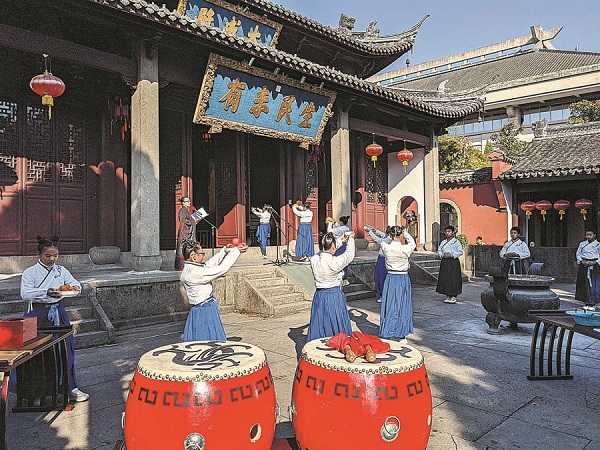
Youngsters pay their respects to Confucius at the temple in Quzhou, Zhejiang province. [Photo provided to China Daily]
In 1998, the Quzhou government invested 18 million yuan ($2.55 million) to repair the temple and, in 2004, the city resumed marking the birthday of Confucius. Since 2009, directors of Confucius Institutes abroad have been invited to attend the ceremony.
In recent years, the temple has remained open to the public, albeit with stringent pandemic control measures in place.
"We have continuously received visitors, including descendants and enthusiasts," says Wang Zhaocheng, who is in charge of the development of the temple culture and tourism zone.
"Every month we have welcomed visitors that hail from all over the world."
Local authorities found that many international visitors have shown great interest in the southern Confucius temple and they share their experiences on social media.
"We have come to realize that tourism provides wings to culture, and culture is the soul of tourism," Wang says.
"The temple is not only the most important culture and tourism resource of Quzhou, but also a calling card, and a window that effectively frames the distinctive characteristics of China," Wang says.
At the moment, the local authorities are working to upgrade the temple culture and tourism zone into a national 5A-ranked destination, the highest rating level.
"We believe it will further enhance the role of the temple as a bridge for cultural inheritance and exchanges," Wang says.
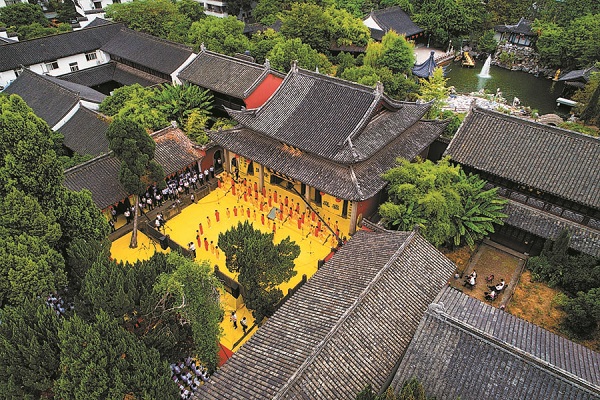
A bird's-eye view of the Confucius ancestral temple. [Photo provided to China Daily]
The Quzhou government has tapped into the essence of Confucianism over the years and taken bold steps to spread the culture.
Government officials have taken the lead in restoring the practice of ancient rituals, such as bowing with both hands folded in front to show mutual respect and proffer best wishes, or to bid farewell.
Free trips to more than 100 scenic spots in the city have been offered to travelers worldwide and the amount of public space has been increased to enhance their experience and increase the opportunity to interact with Confucianism at the temple.
Last year, the Quzhou authorities planned out the temple culture and tourism zone that will bring together 10 major local scenic spots, including the ancient city wall and Xin'an Lake. The zone is expected to cover an area of more than 3.5 square kilometers and is aimed at integrating local ancient city culture, sports, leisure and ecology.
To date, more than 5 billion yuan has been put in to improve infrastructure and renovate the facilities within the zone.
An international culture exchange center for the game of Go, an immersive art museum, standardized sign boards and toilets have all been put into service.
The tourist service center, a historical block, a theater and an academy of classical learning are all under construction and will be completed soon. Boating experiences will also be available shortly.
Kong Lingli, a 76th generation descendant of Confucius, is looking forward to the completion of the project.
He relocated to Quzhou from Ningbo, Zhejiang, and took over the running of the Confucius ancestral temple after his father Kong Xiangkai passed away last year.
Kong Lingli says he believes that it's important for the culture to take root among the following generations before cultural revitalization can be achieved.
"The culture and tourism zone will be an effective approach to make that happen," Kong Lingli says.
He has been popularizing Confucianism among youngsters in schools in Quzhou and has carried out a program that promotes the study of The Analects of Confucius. To help upgrade the temple zone, he has also developed new study tours that provide an explanation of the thoughts of Confucianism and offers the appreciation of an ancient ginkgo tree, with a history of more than 500 years, which is located at the temple.
He has also come up with creative cultural products featuring temple-themed elements, including ginkgo nut cake and pancakes imprinted with the words of Confucius.
"The idea is to construct a channel where tourism can help decode the cultural gene of Confucianism," he explains.
Jin Feng, a scenic spot rating expert, says the construction of the temple culture and tourism zone is an innovative practice to promote the culture of Confucianism in southern China.
"Outstanding culture shouldn't be hidden away on a shelf," Jin says. "Only through utilization and innovative development can it be more effectively protected and carried forward."
The temple zone will also complement top natural landscape destinations in the region, including Huangshan Mountain and Qiandao Lake, to make for a diverse travel experience, experts say.

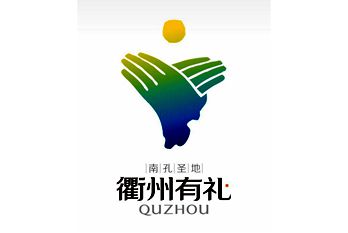 City brand logo - fist-and-palm salute
City brand logo - fist-and-palm salute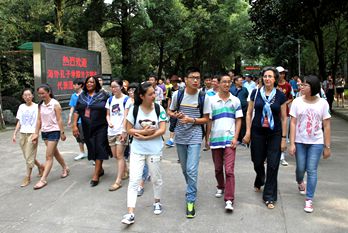 Confucianism on campus
Confucianism on campus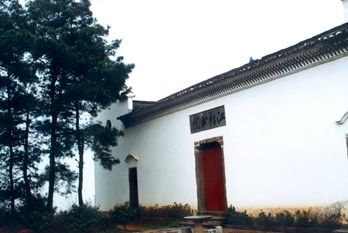 The culture of the academy
The culture of the academy